Module 4 Unit 1 Everyone will study at home.课件+内嵌音视频(外研版英语七年级下册)
文档属性
| 名称 | Module 4 Unit 1 Everyone will study at home.课件+内嵌音视频(外研版英语七年级下册) | 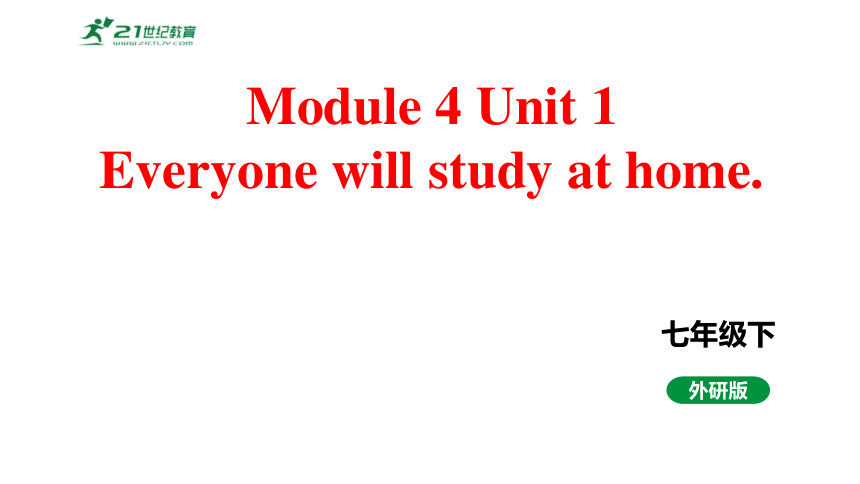 | |
| 格式 | pptx | ||
| 文件大小 | 56.1MB | ||
| 资源类型 | 试卷 | ||
| 版本资源 | 外研版 | ||
| 科目 | 英语 | ||
| 更新时间 | 2024-02-27 16:32:58 | ||
图片预览

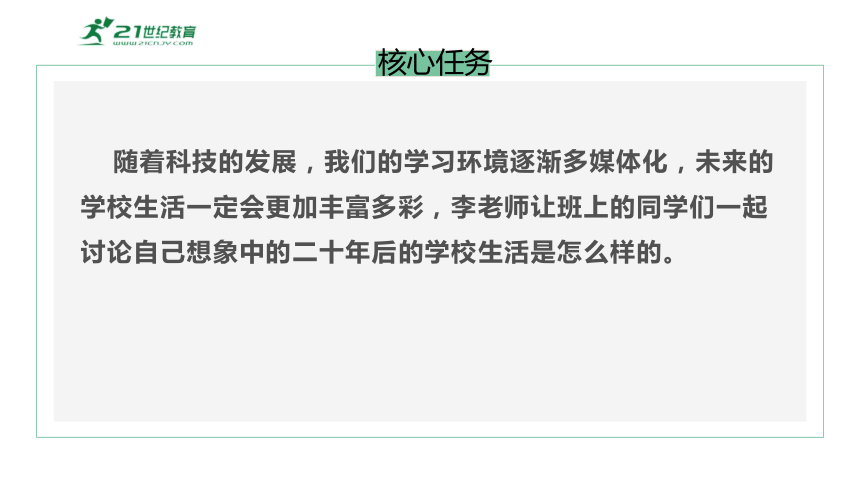
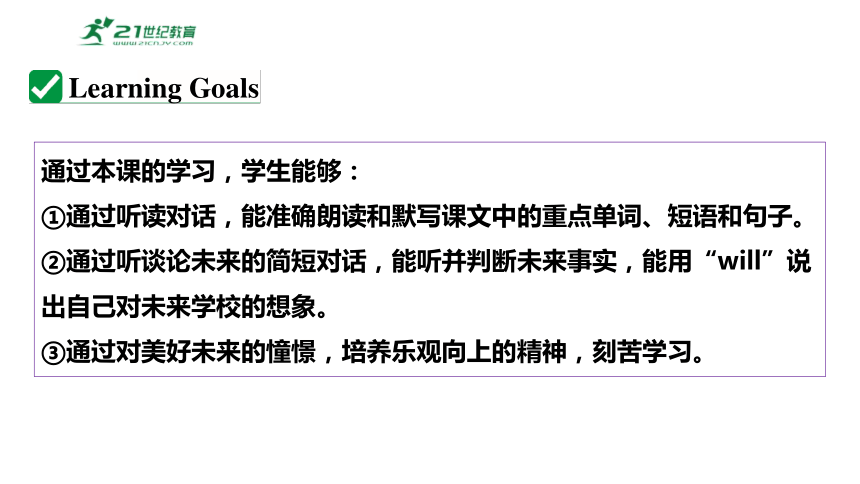
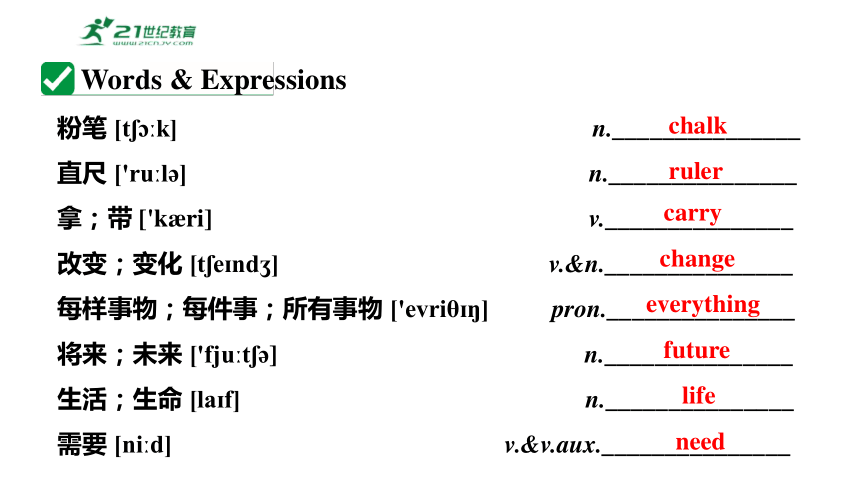
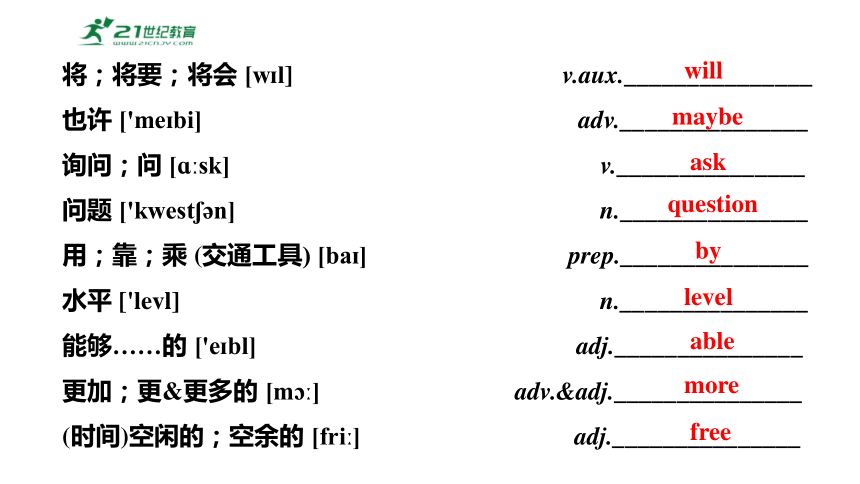
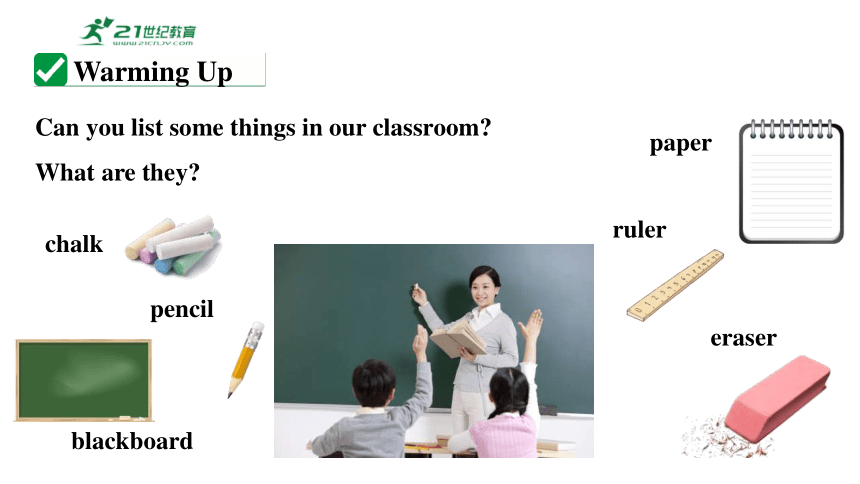
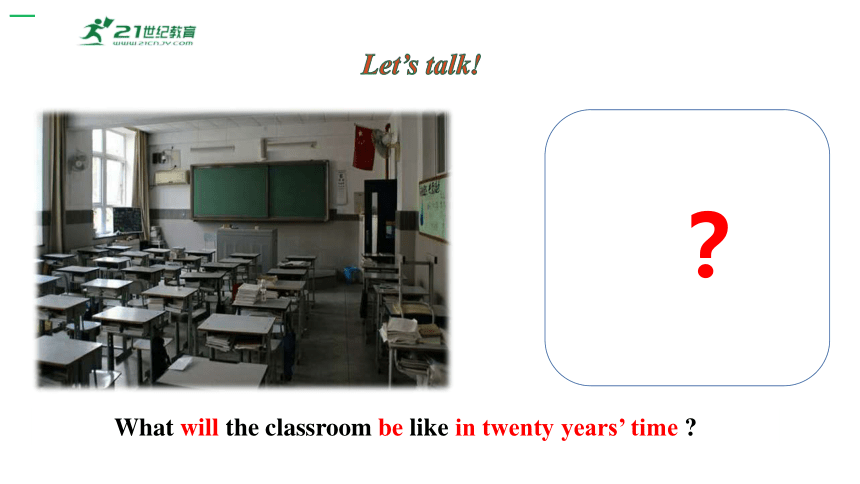
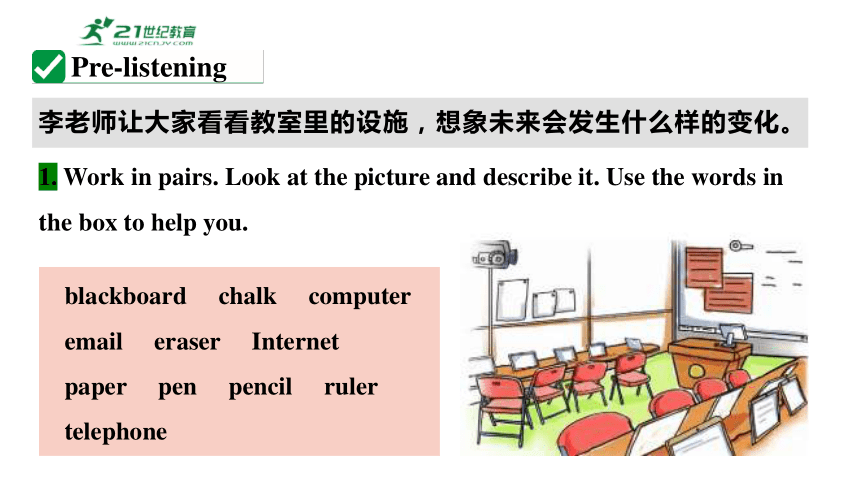
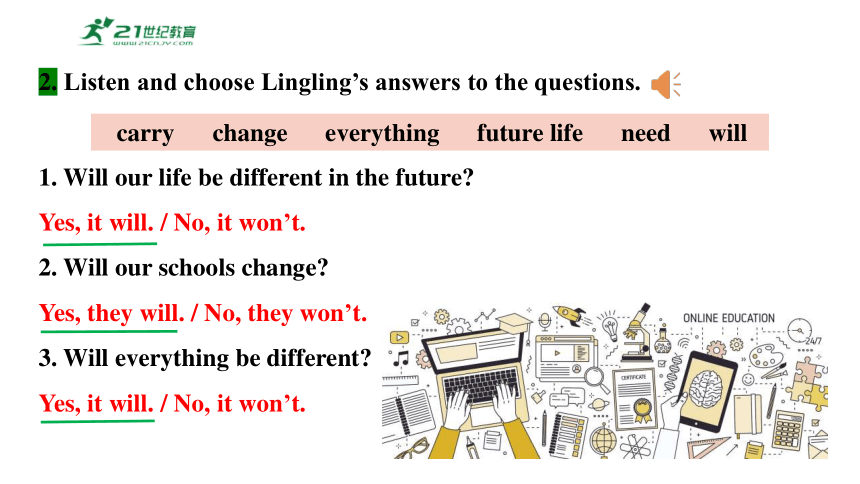
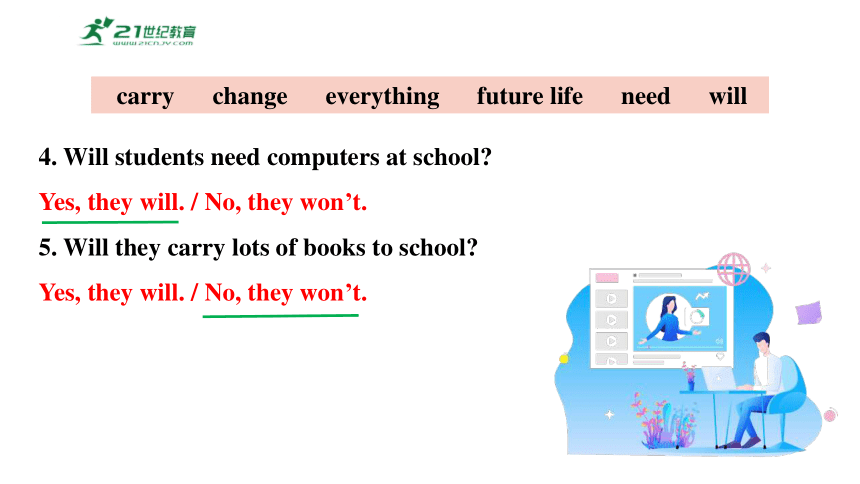
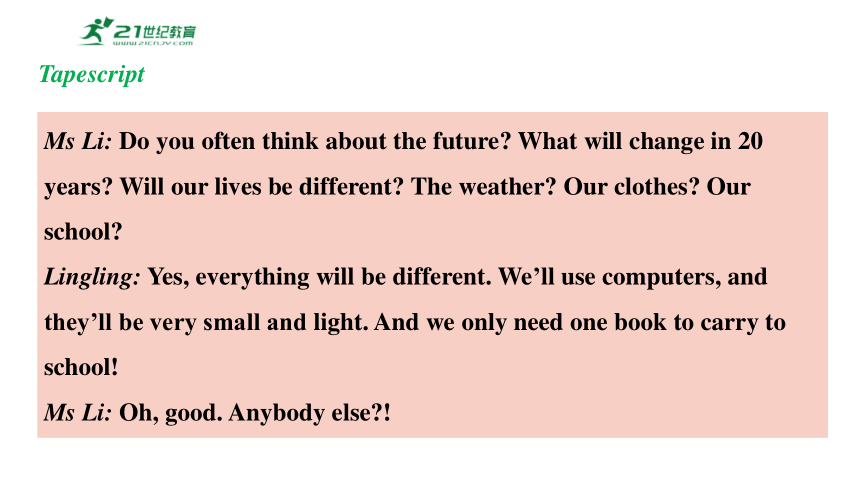
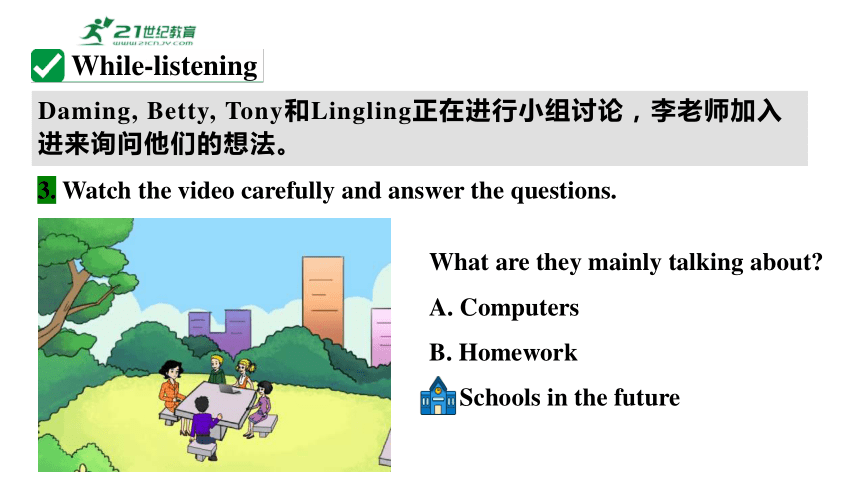
文档简介
(共30张PPT)
Module 4 Unit 1
Everyone will study at home.
七年级下
外研版
随着科技的发展,我们的学习环境逐渐多媒体化,未来的学校生活一定会更加丰富多彩,李老师让班上的同学们一起讨论自己想象中的二十年后的学校生活是怎么样的。
核心任务
Learning Goals
通过本课的学习,学生能够:
①通过听读对话,能准确朗读和默写课文中的重点单词、短语和句子。
②通过听谈论未来的简短对话,能听并判断未来事实,能用“will”说出自己对未来学校的想象。
③通过对美好未来的憧憬,培养乐观向上的精神,刻苦学习。
Words & Expressions
粉笔 [t k] n._______________
直尺 ['ru l ] n._______________
拿;带 ['k ri] v._______________
改变;变化 [t e nd ] v.&n._______________
每样事物;每件事;所有事物 ['evriθ ] pron._______________
将来;未来 ['fju t ] n._______________
生活;生命 [la f] n._______________
需要 [ni d] v.&v.aux._______________
chalk
ruler
carry
change
everything
future
life
need
将;将要;将会 [w l] v.aux._______________
也许 ['me bi] adv._______________
询问;问 [ɑ sk] v._______________
问题 ['kwest n] n._______________
用;靠;乘 (交通工具) [ba ] prep._______________
水平 ['levl] n._______________
能够……的 ['e bl] adj._______________
更加;更&更多的 [m ] adv.&adj._______________
(时间)空闲的;空余的 [fri ] adj._______________
will
maybe
ask
question
by
level
able
more
free
Warming Up
Can you list some things in our classroom
What are they
chalk
blackboard
pencil
paper
ruler
eraser
?
What will the classroom be like in twenty years’ time
Let’s talk!
1. Work in pairs. Look at the picture and describe it. Use the words in the box to help you.
blackboard chalk computer
email eraser Internet
paper pen pencil ruler
telephone
Pre-listening
李老师让大家看看教室里的设施,想象未来会发生什么样的变化。
2. Listen and choose Lingling’s answers to the questions.
carry change everything future life need will
1. Will our life be different in the future
Yes, it will. / No, it won’t.
2. Will our schools change
Yes, they will. / No, they won’t.
3. Will everything be different
Yes, it will. / No, it won’t.
carry change everything future life need will
4. Will students need computers at school
Yes, they will. / No, they won’t.
5. Will they carry lots of books to school
Yes, they will. / No, they won’t.
Ms Li: Do you often think about the future What will change in 20 years Will our lives be different The weather Our clothes Our school
Lingling: Yes, everything will be different. We’ll use computers, and they’ll be very small and light. And we only need one book to carry to school!
Ms Li: Oh, good. Anybody else !
Tapescript
While-listening
What are they mainly talking about
A. Computers
B. Homework
C. Schools in the future
3. Watch the video carefully and answer the questions.
Daming, Betty, Tony和Lingling正在进行小组讨论,李老师加入进来询问他们的想法。
Listen again and check (√) the students’ ideas about the future.
Ideas Daming Betty Tony
Everyone will study at home in the future.
Students will talk to their teachers on the Internet.
School is good fun and you can make friends there.
No one will use pens, paper or erasers.
√
√
√
√
Ms Li: Will schools be different in the future, Daming
Daming: Yes, they will! In twenty years’ time, maybe there won’t be any schools!
Ms Li: How will students learn then
Daming: Everyone will study at home. Students will use computers and get information on the Internet. They can ask their teachers questions by
Internet, telephone or email.①
在将来
二十年后
Betty: Well, I’m not sure. Yes, students will use computers, but school is good fun, and you can make friends there. And teachers can check the students’ level and will help puters won’t be able to do that.
Tony: Yes. Teachers won’t use chalk on a blackboard and students won’t use pens and paper, or erasers any more!
Lingling: Great! Will students have a lot of homework to do
Tony: No, they won’t. They’ll have a lot of free time!
Daming: That’ll be great!
be able to do sth. 有能力做某事
许多
空闲时间,自由时间
not ... any more不再……
Everyday English
· Well, I’m not sure.
· That’ll be great!
Betty: We’ll always (1)________teachers because computers will never be (2)________to check the students’ (3)________and answer their (4)__________by (5)___________or Internet. Will students need to go to school (6)___________ Yes, (7)________they will, because school is good fun, but everyone will have lots of (8)________time.
4. Complete the passage with the correct form of the words and expression from the box.
able any more free level maybe need question telephone
need
level
able
questions
telephone
any more
maybe
free
Post-listening
Disappearing dialogue
Ms Li: Will schools be different in the future, Daming
Daming: Yes, they will!
Ms Li:
Daming: Everyone will study at home.
They can ask their teachers questions by
Internet, telephone or email.
In twenty years’ time, maybe there won’t be any schools!
How will students learn then
Students will use computers and get information on the Internet.
Betty: Well, I’m not sure. Yes, students will use computers, but school is good fun, and you can make friends there.
Tony: Yes. Teachers won’t use chalk on a blackboard and students won’t use pens and paper, or erasers any more!
Lingling:
Tony: No, they won’t.
Daming: That’ll be great!
And teachers can check the students’ level and will help puters won’t be able to do that.
Great! Will students have a lot of homework to do
They’ll have a lot of free time!
5. Listen and mark the stress.
blackboard
computer
eraser
Internet
telephone
Learning to learn
Marking the stressed parts of long
words can help you remember the
pronunciation.
Internet computer
Now listen and repeat.
black/board
com/put/er
e/ras/er
In/ter/net
tel/e/phone
6. Listen and repeat.
/ju / future student use
/ / but fun study us
/u / ruler
/ / put
7. Work in pairs. Ask and answer the questions.
1 Will schools be different in the future
2 Will students use books in the future
8. Work in pairs. Talk about what your school will be like in ten years.
— We will study at home and only go to school for sports and games.
— Well, this is good, but I’ll miss my teachers and friends.
Key Phrases
在将来 ______________________
二十年后 ______________________
有能力做某事 ______________________
许多 ______________________
空闲时间,自由时间 ______________________
不再…… ______________________
in the future
in twenty years’ time
be able to do sth.
a lot of
free time
not ... any more
Language Points
They can ask their teachers questions by Internet, telephone or email.
ask v. 问,询问;要求;请求
①ask sb sth 询问某人某事
e.g. Allen asked me a question, but I didn’t answer.
艾伦问了我一个问题,但我没有回答。
②ask sb to (not) do sth 要求某人(不要)做某事
e.g. The teacher asks me not to be late for school again.
老师叫我上学不要再迟到了。
③ask for sth 请求,恳求(给予)某物
e.g. Many students ask for advice about learning English.
许多学生询问学习英语的建议。
【习语】
ask for it 罪有应得;自讨苦吃;自找麻烦
if you ask me 我认为;依我说
Instant Training
1. It was raining. My father asked me _____ a raincoat.
A. take B. takes C. took D. to take
2. 你如果需要帮助随时可以提出来。
You can ____________ whenever you need it.
D
ask for help
一、根据提示,完成填空。
1. Do you know what__________(生活) will be like in 100 years
2. The __________(问题) are very difficult. Nobody in our class knows the answer to learn.
3. — Are you f______ now
— No, I’m busy doing homework.
4. Do you go to school _________(乘公共汽车) or on foot
life
questions
ree
by bus
Exercises
二、按要求完成句子。
1. 学生们将使用电脑并在网络上获取信息。
Students will use computers and get information_______ ______ ________ .
2. 有人担心将来机器人会取代人类。
Some people worry that robots will replace humans ________ the ________.
3. Robots can talk like humans in 50 years. (改为同义句)
Robots will________ ________ ________ talk like humans in 50 years.
4. 听了父母的话后, 我再也不想玩游戏了。
After hearing my parents’words, I ________ want to play games ________ ________.
on the Internet
in future
be able to
don’t any
more
1. Listening and Speaking: Ms Li and her students are talking about schools in the future.
2. Key vocabulary:
ruler, carry, everything, future, life, need, will, maybe, ask, question, by, able, in the future, be able to
3. Key structures:
① Everyone will…
② —Will students… —Yes, they will. / No, they won’t.
③ How will students…
Summary
Module 4 Unit 1
Everyone will study at home.
七年级下
外研版
随着科技的发展,我们的学习环境逐渐多媒体化,未来的学校生活一定会更加丰富多彩,李老师让班上的同学们一起讨论自己想象中的二十年后的学校生活是怎么样的。
核心任务
Learning Goals
通过本课的学习,学生能够:
①通过听读对话,能准确朗读和默写课文中的重点单词、短语和句子。
②通过听谈论未来的简短对话,能听并判断未来事实,能用“will”说出自己对未来学校的想象。
③通过对美好未来的憧憬,培养乐观向上的精神,刻苦学习。
Words & Expressions
粉笔 [t k] n._______________
直尺 ['ru l ] n._______________
拿;带 ['k ri] v._______________
改变;变化 [t e nd ] v.&n._______________
每样事物;每件事;所有事物 ['evriθ ] pron._______________
将来;未来 ['fju t ] n._______________
生活;生命 [la f] n._______________
需要 [ni d] v.&v.aux._______________
chalk
ruler
carry
change
everything
future
life
need
将;将要;将会 [w l] v.aux._______________
也许 ['me bi] adv._______________
询问;问 [ɑ sk] v._______________
问题 ['kwest n] n._______________
用;靠;乘 (交通工具) [ba ] prep._______________
水平 ['levl] n._______________
能够……的 ['e bl] adj._______________
更加;更&更多的 [m ] adv.&adj._______________
(时间)空闲的;空余的 [fri ] adj._______________
will
maybe
ask
question
by
level
able
more
free
Warming Up
Can you list some things in our classroom
What are they
chalk
blackboard
pencil
paper
ruler
eraser
?
What will the classroom be like in twenty years’ time
Let’s talk!
1. Work in pairs. Look at the picture and describe it. Use the words in the box to help you.
blackboard chalk computer
email eraser Internet
paper pen pencil ruler
telephone
Pre-listening
李老师让大家看看教室里的设施,想象未来会发生什么样的变化。
2. Listen and choose Lingling’s answers to the questions.
carry change everything future life need will
1. Will our life be different in the future
Yes, it will. / No, it won’t.
2. Will our schools change
Yes, they will. / No, they won’t.
3. Will everything be different
Yes, it will. / No, it won’t.
carry change everything future life need will
4. Will students need computers at school
Yes, they will. / No, they won’t.
5. Will they carry lots of books to school
Yes, they will. / No, they won’t.
Ms Li: Do you often think about the future What will change in 20 years Will our lives be different The weather Our clothes Our school
Lingling: Yes, everything will be different. We’ll use computers, and they’ll be very small and light. And we only need one book to carry to school!
Ms Li: Oh, good. Anybody else !
Tapescript
While-listening
What are they mainly talking about
A. Computers
B. Homework
C. Schools in the future
3. Watch the video carefully and answer the questions.
Daming, Betty, Tony和Lingling正在进行小组讨论,李老师加入进来询问他们的想法。
Listen again and check (√) the students’ ideas about the future.
Ideas Daming Betty Tony
Everyone will study at home in the future.
Students will talk to their teachers on the Internet.
School is good fun and you can make friends there.
No one will use pens, paper or erasers.
√
√
√
√
Ms Li: Will schools be different in the future, Daming
Daming: Yes, they will! In twenty years’ time, maybe there won’t be any schools!
Ms Li: How will students learn then
Daming: Everyone will study at home. Students will use computers and get information on the Internet. They can ask their teachers questions by
Internet, telephone or email.①
在将来
二十年后
Betty: Well, I’m not sure. Yes, students will use computers, but school is good fun, and you can make friends there. And teachers can check the students’ level and will help puters won’t be able to do that.
Tony: Yes. Teachers won’t use chalk on a blackboard and students won’t use pens and paper, or erasers any more!
Lingling: Great! Will students have a lot of homework to do
Tony: No, they won’t. They’ll have a lot of free time!
Daming: That’ll be great!
be able to do sth. 有能力做某事
许多
空闲时间,自由时间
not ... any more不再……
Everyday English
· Well, I’m not sure.
· That’ll be great!
Betty: We’ll always (1)________teachers because computers will never be (2)________to check the students’ (3)________and answer their (4)__________by (5)___________or Internet. Will students need to go to school (6)___________ Yes, (7)________they will, because school is good fun, but everyone will have lots of (8)________time.
4. Complete the passage with the correct form of the words and expression from the box.
able any more free level maybe need question telephone
need
level
able
questions
telephone
any more
maybe
free
Post-listening
Disappearing dialogue
Ms Li: Will schools be different in the future, Daming
Daming: Yes, they will!
Ms Li:
Daming: Everyone will study at home.
They can ask their teachers questions by
Internet, telephone or email.
In twenty years’ time, maybe there won’t be any schools!
How will students learn then
Students will use computers and get information on the Internet.
Betty: Well, I’m not sure. Yes, students will use computers, but school is good fun, and you can make friends there.
Tony: Yes. Teachers won’t use chalk on a blackboard and students won’t use pens and paper, or erasers any more!
Lingling:
Tony: No, they won’t.
Daming: That’ll be great!
And teachers can check the students’ level and will help puters won’t be able to do that.
Great! Will students have a lot of homework to do
They’ll have a lot of free time!
5. Listen and mark the stress.
blackboard
computer
eraser
Internet
telephone
Learning to learn
Marking the stressed parts of long
words can help you remember the
pronunciation.
Internet computer
Now listen and repeat.
black/board
com/put/er
e/ras/er
In/ter/net
tel/e/phone
6. Listen and repeat.
/ju / future student use
/ / but fun study us
/u / ruler
/ / put
7. Work in pairs. Ask and answer the questions.
1 Will schools be different in the future
2 Will students use books in the future
8. Work in pairs. Talk about what your school will be like in ten years.
— We will study at home and only go to school for sports and games.
— Well, this is good, but I’ll miss my teachers and friends.
Key Phrases
在将来 ______________________
二十年后 ______________________
有能力做某事 ______________________
许多 ______________________
空闲时间,自由时间 ______________________
不再…… ______________________
in the future
in twenty years’ time
be able to do sth.
a lot of
free time
not ... any more
Language Points
They can ask their teachers questions by Internet, telephone or email.
ask v. 问,询问;要求;请求
①ask sb sth 询问某人某事
e.g. Allen asked me a question, but I didn’t answer.
艾伦问了我一个问题,但我没有回答。
②ask sb to (not) do sth 要求某人(不要)做某事
e.g. The teacher asks me not to be late for school again.
老师叫我上学不要再迟到了。
③ask for sth 请求,恳求(给予)某物
e.g. Many students ask for advice about learning English.
许多学生询问学习英语的建议。
【习语】
ask for it 罪有应得;自讨苦吃;自找麻烦
if you ask me 我认为;依我说
Instant Training
1. It was raining. My father asked me _____ a raincoat.
A. take B. takes C. took D. to take
2. 你如果需要帮助随时可以提出来。
You can ____________ whenever you need it.
D
ask for help
一、根据提示,完成填空。
1. Do you know what__________(生活) will be like in 100 years
2. The __________(问题) are very difficult. Nobody in our class knows the answer to learn.
3. — Are you f______ now
— No, I’m busy doing homework.
4. Do you go to school _________(乘公共汽车) or on foot
life
questions
ree
by bus
Exercises
二、按要求完成句子。
1. 学生们将使用电脑并在网络上获取信息。
Students will use computers and get information_______ ______ ________ .
2. 有人担心将来机器人会取代人类。
Some people worry that robots will replace humans ________ the ________.
3. Robots can talk like humans in 50 years. (改为同义句)
Robots will________ ________ ________ talk like humans in 50 years.
4. 听了父母的话后, 我再也不想玩游戏了。
After hearing my parents’words, I ________ want to play games ________ ________.
on the Internet
in future
be able to
don’t any
more
1. Listening and Speaking: Ms Li and her students are talking about schools in the future.
2. Key vocabulary:
ruler, carry, everything, future, life, need, will, maybe, ask, question, by, able, in the future, be able to
3. Key structures:
① Everyone will…
② —Will students… —Yes, they will. / No, they won’t.
③ How will students…
Summary
同课章节目录
- Module 1 Lost and found
- Unit 1 Whose bag is this?
- Unit 2 Are they yours?
- Unit 3 Language in use
- Module 2 What can you do ?
- Unit 1 I can play the piano
- Unit 2 I can run really fast
- Unit 3 Language in use
- Module 3 Making plans
- Unit 1 What are you going to do at the weekends?
- Unit 2 We're going to cheer the players.
- Unit 3 Language in use
- Module 4 Life in the future
- Unit 1 Everyone will study at home
- Unit 2 Every family will have a small plane.
- Unit 3 Language in use
- Module 5 Shopping
- Unit 1 What can I do for you?
- Unit 2 You can buy everything on the Internet
- Unit 3 Language in use
- Module 6 Around town
- Unit 1 Could you tell me how to get to the Nationa
- Unit 2 The London Eye is on your right.
- Unit 3 Language in use
- Revision module A
- Module 7 My past life
- Unit 1 I was born in a small village.
- Unit 2 I was born in Quincy.
- Unit 3 Language in use
- Module 8 Story time
- Unit 1 Once upon a time….
- Unit 2 Goldilocks hurried out of the house.
- Unit 3 Language in use
- Module 9 Life history
- Unit 1 He left school and began work at the age of
- Unit 2 He decided to be an actor.
- Unit 3 Language in use
- Module 10 A holiday journey
- Unit 1 What did you do?
- Unit 2 This morning we took a walk.
- Unit 3 Language in use
- Module 11 Body language
- Unit 1 They touch noses!
- Unit 2 Here are some ways to welcome them.
- Unit 3 Language in use
- Module 12 Western music
- Unit 1 It's so beautiful!
- Unit 2 Vienna is the centre of European classical
- Unit 3 Language in use
- Revision module B
